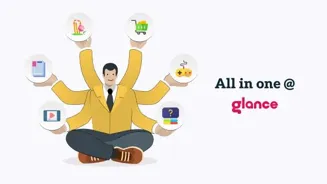Unlocking Career Success Through Adaptability: Learn from Industry Leaders. Dive into 8 crucial lessons for growth
In today's fast-paced, ever-changing job market, one thing is clear: adaptability is no
longer a 'nice-to-have' skill, it's a 'must-have'. Gone are the days when one could stick to a single skillset and expect to climb the career ladder.

Today, industries are disrupted by technology, new business models emerge constantly, and the only way to stay relevant and thrive is to embrace change and adapt accordingly. We spoke to several industry leaders across diverse sectors to gather their insights on how adaptability has played a crucial role in their career growth, and here are eight key lessons they shared:
Embrace Lifelong Learning
The most successful professionals are those who never stop learning. "The moment you think you know everything, you're already behind," says Ms. Sharma, CEO of a leading tech firm.
"Technology is evolving at an exponential rate, and if you're not constantly updating your skills, you'll become obsolete." This doesn't necessarily mean going back to school for another degree.
There are plenty of online courses, workshops, and industry events that can help you stay up-to-date with the latest trends and technologies. The key is to be proactive and make learning a continuous part of your routine. Mr.
Khan, Head HR for a manufacturing company, emphasizes, "Employees who show eagerness to learn new technologies or processes get preference for growth opportunities. They demonstrate they have the necessary skill for the evolving business."
Be Open to New Challenges
Stepping outside your comfort zone can be daunting, but it's often where the most significant growth happens. "I always tell my team to raise their hand for new projects, even if they don't feel fully qualified," shares Mr. Reddy, Director of Marketing at a consumer goods company.
"You learn the most by doing, and taking on challenges that stretch you will help you develop new skills and build your confidence." This also means being willing to take on different roles or responsibilities within your organization.
Sometimes, a lateral move can be just as valuable as a promotion, as it allows you to broaden your experience and gain a new perspective. Ms. Iyer, a senior manager in a finance organisation shares, "Sometimes, you may fail, but you learn so much from the experience.
Each failure provides you a chance to learn and implement the necessary changes to improve in the future."
Develop a Growth Mindset
A growth mindset is the belief that your abilities and intelligence can be developed through dedication and hard work. People with a growth mindset embrace challenges, persist through setbacks, and see failure as an opportunity to learn. "It's crucial to cultivate a growth mindset," asserts Mr.
Patel, founder of a successful startup. "Believe you can learn anything, and don't be afraid to make mistakes. The more you experiment and learn, the more adaptable you become." This contrasts with a fixed mindset, which is the belief that your abilities are fixed and unchangeable.
People with a fixed mindset tend to avoid challenges, give up easily, and see failure as a reflection of their inherent limitations. Having a growth mindset allows one to adapt well with the changes. They constantly seek improvements and work to improve themselves and that's how they adapt.
Network and Connect
Building a strong network of professional contacts can be invaluable for navigating career transitions and staying informed about industry trends. "Your network is your net worth," emphasizes Ms. Singh, a consultant advising entrepreneurs.
"Attend industry events, join professional organizations, and connect with people online. The more people you know, the more opportunities will come your way." Networking isn't just about collecting business cards.
It's about building genuine relationships with people who can offer advice, support, and insights. Attend industry conferences and see what new technologies are introduced. Try to connect with diverse pool of people to get different perspectives.
These learnings are useful in career growth and development.
Become a Problem Solver
Adaptability often requires the ability to think on your feet and find creative solutions to unexpected challenges. "Companies value employees who can identify problems and come up with solutions," says Mr. Verma, head of operations for a logistics company.
"Learn to analyze situations critically, think outside the box, and take initiative to address issues. Proactively solve problems, do not wait to be told. That is a fantastic way to demonstrate you can manage and adapt well with challenges. People should be able to rely on you.
" This also means being able to adapt your problem-solving approach to different contexts and situations. What works in one situation may not work in another, so it's important to be flexible and adaptable in your thinking.
Master Emotional Intelligence
Emotional intelligence is the ability to understand and manage your own emotions, as well as the emotions of others. This is particularly important in times of change, when stress levels are high and people may be feeling uncertain.
"Emotional intelligence is a critical skill for leaders," explains Ms. Gupta, a leadership coach. "Being able to empathize with your team, communicate effectively, and manage conflict will help you navigate change more smoothly.
" Emotional Intelligence helps adapt with the changing work environment. Be aware of how others in your team are feeling and collaborate effectively, by keeping an open mind and listening to their needs. The team will feel more emotionally secure and well aligned.
Stay Curious and Ask Questions
Never lose your sense of curiosity. Always be eager to learn new things and explore new ideas. "The most innovative ideas often come from asking 'what if?' " says Mr. Bose, CFO of a manufacturing firm. " Don't be afraid to question the status quo and challenge conventional wisdom.
" Asking questions is a great way to learn and understand things better. It also shows that you're engaged and interested in what's going on around you. Staying current with the current news and technology changes goes a long way in adapting to the changes in business.
Be Resilient and Persistent: Change can be difficult, and setbacks are inevitable. The key is to be resilient and persistent in the face of adversity. "Don't let setbacks discourage you," advises Ms. Das, a successful entrepreneur. "Learn from your mistakes, pick yourself up, and keep moving forward." Resilience is the ability to bounce back from adversity, and persistence is the ability to keep going even when things are tough. These qualities are essential for navigating the challenges of a changing career landscape. It is important to take short breaks and de-stress when experiencing significant challenges at the work front.
In conclusion, adaptability is not just a desirable trait, but a necessity for career growth in today's dynamic world.
By embracing lifelong learning, being open to new challenges, developing a growth mindset, networking, becoming a problem solver, mastering emotional intelligence, staying curious, and being resilient, you can position yourself for success in any industry and at any stage of your career.
Remember, change is the only constant, and those who can adapt and thrive in the face of change are the ones who will truly excel.




















